|
|
|
Sort Order |
|
|
|
Items / Page
|
|
|
|
|
|
|
| Srl | Item |
| 1 |
ID:
065002
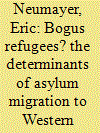

|
|
|
| 2 |
ID:
118168


|
|
|
|
|
| Publication |
2012.
|
| Summary/Abstract |
Recent research suggests that double taxation treaties (DTTs) increase bilateral foreign direct investment (FDI). However, entering such a tax treaty is not unambiguously favorable for both partners if their bilateral FDI positions are asymmetric. Due to the usual bias toward residence-based taxation in DTTs, net capital importers can face a considerable loss of tax revenues when entering these treaties. Nevertheless, there is an ever denser and growing global network of such treaties. This article argues that net capital-importing countries are caught in a prisoners' dilemma: Collectively, they would be better off refusing to sign DTTs, but each one has an incentive to sign DTTs to gain a competitive advantage. Countries will look toward and be influenced by the policy choices of other focal countries and will follow their DTT activity. We find evidence for such spatial dependence in our analysis of DTT diffusion in a global sample over the period 1969-2005. Dyads are more likely to sign a DTT the more DTTs have previously been concluded by the regional peers of the dyad members as well as by other countries who compete with at least one of the dyad members in terms of export product structure.
|
|
|
|
|
|
|
|
|
|
|
|
|
|
|
|
| 3 |
ID:
083247


|
|
|
|
|
| Publication |
2008.
|
| Summary/Abstract |
This study investigates whether ethnic and other forms of social diversity affect militarization of society. Recent scholarship in economics finds that high diversity leads to lower provision of public goods. At the same time, many conflict studies find that highly diverse societies face a lower risk of civil war, as opposed to relatively more homogenous populations. The authors explore whether diversity prompts governments to militarize heavily in order to prevent armed conflict, which would then crowd out spending on other public goods in a `guns versus butter' trade-off. Thus, `preventive militarization' would explain both outcomes. Yet the authors find the opposite: higher levels of ethnic diversity predict lower levels of militarization. If high diversity lowers the hazard of civil war, as many find, then it does not happen via preventive militarization. If diverse societies spend less on public goods, then this is not because they are crowded out by security spending. The results support those who suggest that diversity may, in fact, pose a lower security threat to states, since it is highly likely that states facing potential social strife would prioritize state militarization.
|
|
|
|
|
|
|
|
|
|
|
|
|
|
|
|
| 4 |
ID:
066357


|
|
|
| 5 |
ID:
109583
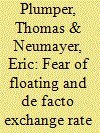

|
|
|
|
|
| Publication |
2011.
|
| Summary/Abstract |
This paper adopts and develops the "fear of floating" theory to explain the decision to implement a de facto peg, the choice of anchor currency among multiple key currencies, and the role of central bank independence for these choices. We argue that since exchange rate depreciations are passed-through into higher prices of imported goods, avoiding the import of inflation provides an important motive to de facto peg the exchange rate in import-dependent countries. This study shows that the choice of anchor currency is determined by the degree of dependence of the potentially pegging country on imports from the key currency country and on imports from the key currency area, consisting of all countries which have already pegged to this key currency. The fear of floating approach also predicts that countries with more independent central banks are more likely to de facto peg their exchange rate since independent central banks are more averse to inflation than governments and can de facto peg a country's exchange rate independently of the government.
|
|
|
|
|
|
|
|
|
|
|
|
|
|
|
|
| 6 |
ID:
102505
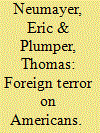

|
|
|
|
|
| Publication |
2011.
|
| Summary/Abstract |
Americans are a major target of international terrorism. Yet, terrorists from some countries are much more likely to attack American citizens than terrorists from other countries. Similarly, anti-American terrorism from a specific foreign country is much more prevalent during certain periods than others. This article develops a rational theory of international terrorism, which argues that attacking foreign nationals is of strategic value to terrorists even if they ultimately aim at gaining political influence in their home country. Attacking foreigners is the more attractive to domestic terrorists the more the terrorists' home government depends on military support from the foreign country. Applied to the US case, our theory predicts that more anti-American terrorism emanates from countries that receive more US military aid and arms transfers and in which more American military personnel are stationed, all relative to the country's own military capacity. Estimations from a directed country dyad sample over the period 1978 to 2005 support the predictions of our theory for both terrorist incidents involving Americans and terrorist killings of Americans as dependent variables. These results are robust to a wide range of changes to the empirical research design.
|
|
|
|
|
|
|
|
|
|
|
|
|
|
|
|
| 7 |
ID:
094966


|
|
|
|
|
| Publication |
2010.
|
| Summary/Abstract |
Terrorism is an instrument for groups that cannot achieve their political goals legally. One important strategic function of terrorism is to weaken the government - either directly by attacking representatives or supporters of the government or indirectly by causing a political response that is unpopular among the population. Often, however, political stability of the home government is buttressed by foreign powers. In this case, the terrorists can have a strategic interest in attacking nationals of these foreign countries. This article analyses this logic by looking at international alliances as a proxy for international support. If the friend of my enemy is my enemy, then terror entrepreneurs, which seek to overthrow their home country's government (the enemy), may find it attractive to target nationals of the foreign allies of their country (the friends of the enemy). The theory in this article predicts that attacking nationals of a foreign ally is particularly attractive if this ally is militarily more powerful than the home country. Moreover, the combined effect of alliance and relative power differentials becomes stronger the more democratic the ally and becomes weaker the more democratic the terrorists' home country. Empirical support for the hypotheses in this article is found in an analysis of a directed country dyad sample of international terrorism.
|
|
|
|
|
|
|
|
|
|
|
|
|
|
|
|
| 8 |
ID:
052179
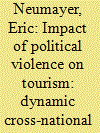

|
|
|
|
|
| Publication |
April 2004.
|
| Summary/Abstract |
The hypothesis that political violence deters tourism is mainly based on case study evidence and a few quantitative studies confined to a small sample of countries. Two estimation techniques-a fixed-effects panel estimator with contemporaneous effects only and a dynamic generalized method of moments estimator-are used to test the impact of various forms of political violence on tourism. Both models show strong evidence that human rights violations, conflict, and other politically motivated violent events negatively affect tourist arrivals. In a dynamic model, even if autocratic regimes do not resort to violence, they have lower numbers of tourist arrivals than more democratic regimes. Results also show evidence for intraregional, negative spillover, and cross-regional substitution effects
|
|
|
|
|
|
|
|
|
|
|
|
|
|
|
|
| 9 |
ID:
067397
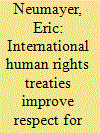

|
|
|
| 10 |
ID:
094983
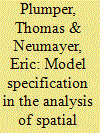

|
|
|
|
|
| Publication |
2010.
|
| Summary/Abstract |
The recent surge in studies analysing spatial dependence in political science has gone hand-in-hand with increased attention paid to the choice of estimation technique. In comparison, specification choice has been relatively neglected, even though it leads to equally, if not more, serious inference problems. In this article four specification issues are analysed. It is argued that to avoid biased estimates of the spatial effects, researchers need to consider carefully how to model temporal dynamics, common trends and common shocks, as well as how to account for spatial clustering and unobserved spatial heterogeneity. The remaining two specification issues relate to the weighting matrix employed for the creation of spatial effects: whether it should be row-standardised and what functional form to choose for this matrix. The importance of these specification issues is demonstrated by replicating Hays' model of spatial dependence in international capital tax rate competition. Seemingly small changes to model specification have major impacts on the spatial effect estimates. It is recommended that spatial analysts develop their theories of spatial dependencies further to provide more guidance on the specification of the estimation model. In the absence of sufficiently developed theories, the robustness of results to specification changes needs to be demonstrated.
|
|
|
|
|
|
|
|
|
|
|
|
|
|
|
|
| 11 |
ID:
090917
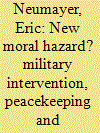

|
|
|
|
|
| Publication |
2009.
|
| Summary/Abstract |
The newly established International Criminal Court (ICC) promises justice to the victims of genocide, war crimes and crimes against humanity. Past offenders can be punished, while future potential offenders may be deterred by the prospect of punishment. Yet, justice is no substitute for intervention for the benefit of people at acute risk of being victimized. The Court may create a new moral hazard problem if the promise of ex post justice makes it easier for states to shy away from incurring the costs of intervention. This article indirectly tests for the relevance of this potential problem by estimating the determinants of ratification delay to the Rome Statute of the ICC. If the Court represents an excuse for inaction, then countries that are unwilling or unable to intervene in foreign conflicts should be among its prime supporters. Results show instead that countries that in the past have been more willing to intervene in foreign civil wars and more willing to contribute troops to multinational peacekeeping missions are more likely to have ratified the Statute (early on). This suggests that the Court is a complement to, not a substitute for intervention.
|
|
|
|
|
|
|
|
|
|
|
|
|
|
|
|
| 12 |
ID:
131490


|
|
|
|
|
| Publication |
2014.
|
| Summary/Abstract |
Existing accounts posit that defensively oriented counterterrorist policies create negative externalities and result in regulatory competition that induces governments to increasingly tighten their policies. We argue that rather than causing an unconditional global "race to the top," spatial dependence in counterterrorist policies is limited to within groups of countries exposed to a similar level of threat from international terrorism. Countries strongly differ in their propensity to become the target of an international terror attack. Governments can safely ignore counterterrorist policies enacted by countries outside their "peer group," but they must pay attention to measures undertaken by their peers. We test several predictions derived from our theory in an empirical analysis of counterterrorist regulations in twenty Western developed-country democracies over the period 2001 to 2008.
|
|
|
|
|
|
|
|
|
|
|
|
|
|
|
|
| 13 |
ID:
072142
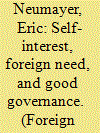

|
|
|
|
|
| Publication |
2006.
|
| Summary/Abstract |
Bilateral investment treaties (BITs) have become the most important legal mechanism for the encouragement and governance of foreign direct investment (FDI) in developing countries. Yet practically no systematic evidence exists on what motivates capital-exporting developed countries to sign BITs earlier with some developing countries than with others, if at all. The theoretical framework from the aid allocation literature suggests that developed countries pursue a mixture of self-interest, foreign need and, possibly, good governance. We find evidence that both economic interests of developed countries' foreign investors and political interests of developed countries determine their scheduling of BITs. However, foreign need as measured by per capita income is also a factor, whereas good governance by and large does not matter. These results suggest that BIT programs can be explained using the same framework successfully applied to the allocation of aid. At the same time, self-interest seems to be substantively more important than developing country need when it comes to BITs.
|
|
|
|
|
|
|
|
|
|
|
|
|
|
|
|
|
|
|
|
|